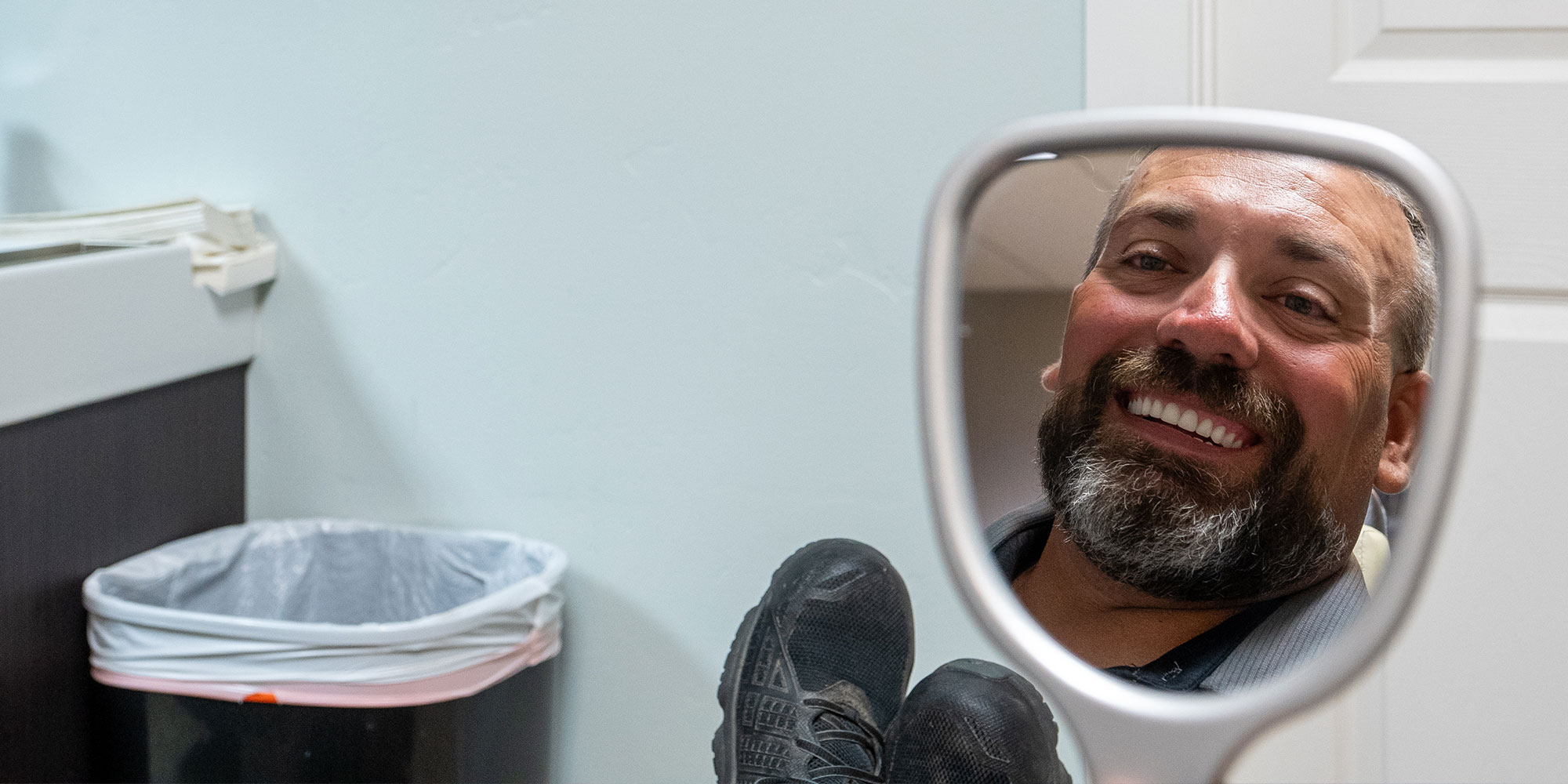
Experience comprehensive dental care at Big Sky Smiles & Sedation, where we specialize in addressing many standard and complex dental concerns. With our expertise and advanced training as board-certified dentists, we can restore your smile to optimal health and beauty. From removing infected wisdom teeth to replacing missing teeth, trust us to provide personalized solutions tailored to your needs in Missoula, MT.
Impacted teeth are those that haven’t erupted fully through the gums. They can occur with stubborn baby teeth, wisdom teeth, and sometimes permanent adult teeth. There are various reasons why adult teeth can have a difficult time erupting. Among the most common reasons are a higher-than-normal number of teeth in the mouth, obstructive growths, and overcrowding from surrounding teeth. Impacted teeth can cause a number of problems for the patient starting at an early age.
If these teeth cannot come in fully, the child may have difficulty eating normally, as well as pain and tooth misalignment. In many other cases, symptoms may not appear until an X-ray presents the issue. We can offer a few options to resolve impacted teeth, including working with an orthodontist to guide the tooth to the proper placement. In the case of wisdom teeth, we often recommend extraction.
Commonly known as “wisdom teeth,” third molars typically emerge during the late teenage years or early 20s and can potentially cause various oral health problems. Almost 90% of people have had at least one impacted wisdom tooth, indicating insufficient space for the teeth to erupt into a normal position. Their location in the very back of the mouth makes them hard to clean and, therefore, more prone to decay, infection, gum disease, pain, and even the development of cysts or tumors in the surrounding tissues!
They can also throw neighboring healthy teeth out of alignment. Often, wisdom teeth are located close to nerves, sinus cavities, and other teeth, so you must have a skilled expert remove them if they become impacted. As board-certified dentists, we’re exceptionally qualified to remove your wisdom teeth while maintaining comfort and safety.
Teeth can become broken or infected for several reasons, including trauma and decay. Bacterial buildup due to poor dental hygiene is often the cause of dental infections. Sometimes repairs, medications, or a combination of both enable our doctors to save your tooth. In such cases, we thoroughly evaluate your teeth to determine the treatment best suits your specific issue. When extensive damage or decay, some teeth cannot be rehabilitated through treatment. Though we do our utmost to preserve your natural teeth, extraction may be our only option.
The extraction process for most teeth is pretty straightforward. After making you comfortable with anesthesia, we gently grip the tooth with forceps and carefully pull it loose from the socket. Unless it’s a wisdom tooth, it should be replaced once removed to restore the function and esthetics of your smile and protect your jaw from deterioration. Dental implants are the best overall tooth replacement option, not just in function and aesthetics but also for long-lasting performance.
Missing teeth can limit your ability to eat, speak, and smile comfortably, and they may have more profound implications beyond simple chewing function and smile aesthetics. Teeth rely on each other for support. When one is missing, the teeth on either side of the gap can shift out of alignment, eventually requiring orthodontic treatment. Further, the absence of tooth roots in the jawbone can cause the jawbone to begin receding, leading to further tooth loss and giving your face an unhealthy, sunken, and even prematurely aged appearance!
Dental implants, recognized as today’s “gold standard” for tooth replacement, can prevent you from experiencing any of those issues. Suppose you follow a tooth extraction or trauma-related tooth loss with dental implant placement. In that case, you can continue eating the foods you love, speak and smile without embarrassment, and even significantly boost your self-confidence. All this can be yours since nothing looks more authentic or lasts longer than our dental implants in Missoula, MT. Even if you’ve already begun to suffer bone loss, our board-certified dentists can reverse it through bone grafting before placing your dental implants.
Your jawbone relies on the stimulation of tooth roots and the regular sensation of chewing to keep it healthy. The bone can deteriorate with tooth loss unless those missing teeth are replaced quickly. This bone loss has many short-term and long-term consequences. You can lose more teeth through a “domino effect” of tooth loss. Your facial features can sink, and an aged, unhealthy look can replace your distinctive appearance you won’t want or even recognize.
Fortunately, our team of board-certified dentists is extensively trained in treating even the most severe cases of bone loss. We can give new teeth and a new life to patients who may otherwise have to settle for living without teeth. Beyond single and full mouth dental implant solutions with bone grafting treatment plans, we also offer zygomatic dental implants. These specialized implants can help patients who have lost significant bone. Placed in specialized facial bone beyond the jawbone, zygomatic implants are precisely placed for lasting security.
Treating chronic gum disease involves a multi-faceted approach tailored to each individual’s needs. Firstly, meticulous oral hygiene practices, including regular brushing, flossing, and mouthwash use, are essential to control plaque buildup and prevent further progression. Professional dental and deep cleanings, known as scaling and root planing, help remove hardened plaque and bacteria from below the gumline. In some cases, antibiotics or antimicrobial mouth rinses may be prescribed to combat persistent infection. Finally, ongoing monitoring by a dentist or periodontist is crucial to assess the effectiveness of treatment and make any necessary adjustments to maintain gum health.
Treating loose dentures typically involves adjustments and enhancements to improve their fit and function. Denture adhesive can provide temporary relief by enhancing stability, but a more permanent solution often requires professional intervention. We may adjust the dentures’ fit by adding or reshaping the acrylic base or changing the clasps for better retention.
In some cases, denture relining or rebasing may be necessary to ensure a snug fit against the gums. For individuals experiencing severe looseness or discomfort, implant-supported dentures offer a long-term solution by anchoring the dentures securely to dental implants in the jawbone.
Treating gummy smiles involves various approaches tailored to the underlying causes and severity of the condition. Non-invasive options may include botulinum toxin injections to relax the upper lip’s muscles, reducing its elevation during smiling. Orthodontic treatments such as clear aligners may be recommended to correct jaw alignment issues contributing to a gummy appearance. For more severe cases, surgical procedures like gingivectomy or crown lengthening can be performed to reduce the gum display.
Treating bleeding gums typically starts with improving oral hygiene habits, such as thorough brushing, flossing, and using antimicrobial mouthwash to reduce plaque buildup and inflammation. Regular dental check-ups are essential to detect and address any underlying dental issues contributing to bleeding gums, such as gum disease or infections. Professional dental cleanings, including scaling and root planing, help remove hardened plaque and tartar below the gum line, reducing inflammation and bleeding.
In some cases, dentists may recommend lifestyle changes such as quitting smoking, as smoking can exacerbate gum inflammation and increase the risk of bleeding. For severe cases of gum disease, more intensive treatments like gum surgery or antibiotic therapy may be necessary to control infection and restore gum health.
Gum recession occurs when the gum tissue surrounding the teeth wears away or pulls back, exposing more of the tooth and sometimes its root. Common causes include aggressive brushing, periodontal disease, genetics, and hormonal changes. Symptoms may include tooth sensitivity, tooth appearance elongation, or notching at the gumline.
Treatment options depend on the recession’s severity and may include scaling and root planing, gum grafting, or other surgical procedures to cover exposed roots and prevent further recession. Regular dental check-ups are crucial for early detection and management of gum recession to prevent potential complications like tooth loss.
